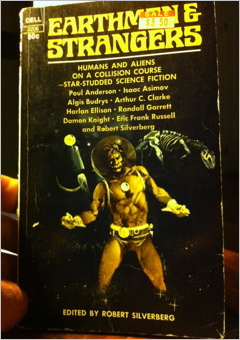Imperative Precautionary Haiku Reviews of the Stories in “Earthmen & Strangers”

I recently picked up a used copy of Earthmen and Strangers, a 1966 anthology of short stories edited by Robert Silverberg. As the cover attests, the book contains “humans and aliens on a collision course – star-studded science fiction.”
In 2010, I posted some haiku reviews of stories I’d recently read. I did some limericks as well. They were all very cheesy, but fun to write. Now I am reviving the gimmick with a new series of haiku reviews. In this post, there is an additional conceit – each bit is phrased as a vague sort of warning to some character or group in the story.
As before, it would be better to call these “synopses” or “selected impressions” instead of reviews. My intent is not to decree whether they have any literary merit, and certainly not to tell you what you should or should not read. In some cases, of course, I can’t help but comment on aspects that would seem out of place if these were written today. The haikus are just a fun record of what I’ve read. Hopefully they give you a taste of what I got from each tale.
Title and author links go to bibliographies at The Internet Speculative Fiction Database.
Dear Devil by Eric Frank Russel
Leave us your poets,
wise passers-by, for who else
might notice hope here.
A Martian artist lingers on ruined Earth, clumsily raising the remnants of humanity.
The Best Policy by Randall Garrett
Listen, my liars –
if cornered by creatures,
the truth will set you free.
Tactful answers to an alien polygraph avert invasion.
Wade among many,
emissary, but risk wanes
your identity.
Rugged individualists from earth make poor company for a little collectivist.
Stand up for yourselves,
women of hot shade and shell;
your men are not gods.
Stranded spacemen help the ignorant natives dispel an abusive cult and seek gender equity. Don’t worry, it’s not a white savior scenario: one of the men is Basque and the other Mohawk!
The Gentle Vultures by Isaac Asimov
Don’t be so hasty,
postwar planet beachcombers,
to assume our doom.
Opportunistic invaders are frustrated by our failure to destroy ourselves.
Stranger Station by Damon Knight
Question the motive
of the gift of elixir –
be tamed and changed by the ichor.
The new human occupant of a lonely trading post prepares for the periodic return of the other party.
I thought this was the most compelling story in the collection. Perhaps it is because the stranger is a truly alien presence: there are no little green men or translator hats here.2
The protagonist suffers from a desperate sense of anxiety and belated revelation as the alien approaches. His urgent effort to understand the purpose of the rendezvous – complicated by the calculated recalcitrance of his computer companion – convincingly depicts what it is like to confront the unknown.
Lower Than Angels by Algis Budrys
Patience, prospector,
lest your raw materials
make too much of you.
A small town sheriff is seduced by a victim’s widow.
Wait, wrong synopsis. This isn’t the NYT best seller list! Here we go:
A scout strives not to deceive the people he meets, but first impressions prove hard to shake.
Blind Lightning by Harlan Ellison
In case of capture,
give courage to your captor.
Release; death; rapture.
A disgraced scientist finds redemption by aiding his aggressor.
Out Of The Sun by Arthur C. Clarke
Behold, a last gasp
is glanced, like rippled glass,
as solar souls elapse.
Astronomers on Mercury see traces of something more than plain old radiation in the radar scans of a short-lived coronal mass ejection.
Some general criticisms:
-
All of the earthmen are exactly that: men. (Not counting the girls abducted to help restart society in Dear Devil.) Women: the greatest alien of all to the men of 1950s science fiction?
-
Many of these stories rely on an automatic communicator or translator device to facilitate dialogue between the titular earthmen and strangers. I think this makes the alien seem more like the merely foreign, with an attendant risk of portraying the aliens as little more than funny-colored people with weird cultures to figure out – or vice versa.
But, more generously, I recognize that the universal translator is a rhetorical device that helps a story advance beyond the mechanics of first contact to a “dialectical” phase where the story’s main ideas can be discussed directly by the characters themselves.
Last but not least, here are physical descriptions of some of the authors, as editor Robert Silverberg saw fit to include in his introductions to their stories:
- Eric Frank Russel is “a towering Englishman”
- Randall Garrett is “a bearded, booming-voiced man”
- Poul Anderson is “a lanky chap of Viking descent”
- Isaac Asimov is “jovial and even boisterous in the flesh”
- Damon Knight is “a slender, soft-spoken man with a deceptively mild smile”
- Algis Budrys “has the general dimensions of an outstanding fullback”
Posted on Wednesday, October 10th, 2012. Tags: art, books, haiku, reviews.
